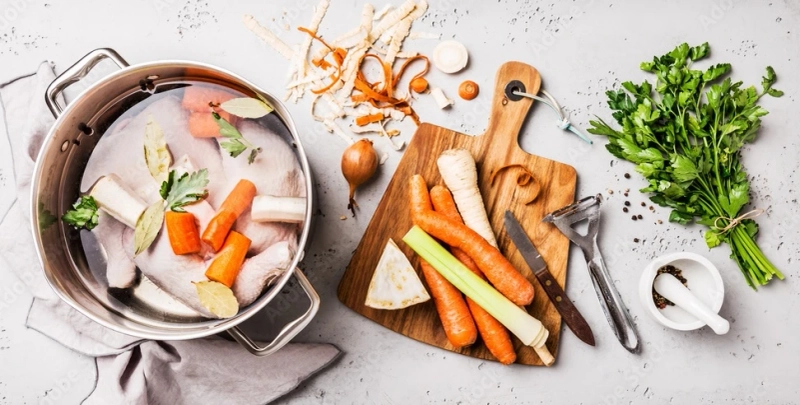Winter is a season for warmth, excellent food, and cosiness!
Winter is the season for consuming healthy foods, such as fresh green leafy vegetables, fruits, and many other food items that give the body an abundance of nutrients, preparing it for the remainder of the year.
Winter vegetables contain numerous vegetables that provide our bodies with warmth during chilly times. Moreover, winter veggies are available in various vibrant hues and include numerous significant nutrients and flavours.
Let's talk about the varieties of winter vegetables accessible in India, their health advantages, and how they might help you increase your metabolism.
Winter Vegetables To Boost Your Metabolism
Here is a list of winter veggies that will aid in weight loss, increase your metabolism, and help you combat various diseases.
1. Carrots - Prevents Serious Illnesses
Carrots are an excellent source of beta-carotene, which is beneficial for the eyes and includes numerous antioxidants. Additionally, it combats free radicals in the body and reduces the likelihood of developing severe diseases. In addition, carrots tend to prevent cancer-causing cells, maintain heart health, regulate blood pressure, improve immunity, and help regulate diabetes.
Nutritional value of 100 grammes of carrot
Calories- 35 kcalFat- 0.2gProtein- 0.8gCarbohydrates- 8.2gPotassium- 235mgSodium- 58mgFibre- 3gVitamin A- 16706 IU
2. Tomatoes- Preserve Skin Youth
Tomatoes are rich in lycopene, an anti-ageing antioxidant that aids in maintaining the skin's youthful appearance. In addition, tomato lowers blood pressure in the body, reducing cardiac problems and encouraging healthy digestion.
Nutritional value in 100g tomatoes
Calories- 18 kcalFat- 0.2gProtein- 0.9 grammesCarbohydrates- 3.9 grammes Potassium- 237 milligrammesSodium- 5mgFibre- 1.2gVitamin A- 833 IU
3. Spinach Is Rich In Minerals
Spinach provides nutrients such as iron, magnesium, and antioxidants, which enhance immunity and prevent a variety of illnesses, including kidney disease, gastrointestinal diseases, and nerve and brain damage. The nutrients strengthen immunity, and the potassium level of spinach helps control hypertension.
Nutritional value of 100g Spinach
Calories- 23kcal Fat- 0.3gProtein- 3gCarbohydrates- 3.8gPotassium- 466mgSodium- 70mgFibre- 2.4g4. Green Peas - Enhance Digestion
Carotenoids, zeaxanthin, and lutein, which are abundant in green peas, protect the eyes from cataracts and macular degeneration. Moreover, the spinach's fibre content aids digestion and has anti-inflammatory qualities because it includes minerals that strengthen immunity.
Nutritional value of 100g of green peas
Calories- 84 kcalFat- 0.2gProtein- 5.4g Carbohydrates- 16gPotassium- 271mgSodium- 3mgFibre- 5.5g5. Capsicum- Prevents Age-Related Signs
Capsicum is rich in vitamin C, vitamin A, and vitamin B6, which combat free radicals in the body and reduce fine lines and wrinkles to prevent the onset of ageing. Additionally, vitamin C stimulates collagen formation and rejuvenates the skin.
Nutritional value of 100 grammes of bell pepper
Calories- 26 kcalFat- 0.3gProtein- 0.99g Carbohydrates- 6.03gPotassium- 211mgSodium- 2mgFibre- 2g
Maintains Normal Blood Sugar Levels
Rich in folate, potassium, calcium, vitamin C, and vitamin B6, radish improves bone health, is fantastic for the skin, aids in the treatment of jaundice inhibits the creation of cancer cells, and maintains healthy, blemish-free skin. In addition, it maintains the blood sugar level and electrolyte balance.
Nutritional value of 100 gm radishes
Calories- 16 kcalFat- 0.1g Protein- 0.7g Carbohydrates- 3.4gPotassium- 233mgSodium- 39mgFibre- 1.6g
7. Mustard Greens Enhance Bone Health
Also known as sarso ka saag, this dish is typically eaten by northern Indians with roti made from maise flour. Mustard green is rich in minerals and antioxidants, which have anti-inflammatory qualities and promote the body's detoxification. It also improves bone and eye health and has cancer-fighting properties.
Nutritional value of 100 grammes of mustard greens
Calories- 26 kcalFat- 0.2g Protein- 2.7g Carbohydrates- 4.9gPotassium- 354mgSodium- 25mgFibre- 3.3gCalcium- 103mgVitamin C- 70mgVitamin A- 525mcg8. Cauliflower- Reduces Digestive Problems
Cauliflower is rich in fibre, vitamin C, cancer-fighting chemicals, and choline, which improves brain health, cleanses the blood, maintains heart health, and alleviates stomach difficulties.
Nutritional value of 100g of cauliflower
Calories- 26 kcalFat- 0.2gProtein- 2.7g Carbohydrates- 4.9gPotassium- 354mgSodium- 25mgFibre- 3.3g9. Broccoli- Maintains Cholesterol Control
Broccoli is rich in minerals, vitamins, and antioxidants. It has numerous health benefits, such as regulating cholesterol levels, lowering the risk of heart disease, increasing the immune system, and being safe to ingest during pregnancy.
Nutritional value of 100g of broccoli
Calories- 35 kcalFat- 0.4g Protein- 2.4g Carbohydrates- 7.2gPotassium- 293mgSodium- 41mgFibre- 3.3g10. Sweet Potatoes - Muscle Relaxant
You can consume sweet potatoes by roasting or boiling them with chat masala or adding sprouts or paneer to make a delightful chat. They are rich in fibre, vitamin A, beta-carotene, and vitamin C, as well as antioxidants that aid in reducing muscle tension, stress, and heart disease.
Nutritional value in 100 grammes of sweet potatoes
Calories- 90 kcalFat- 0.2g Protein- 2gCarbohydrates- 21gPotassium- 475mgSodium- 36mgFibre- 3.3g
The Final Say
Wintertime necessitates the consumption of nutritious, colourful veggies. There are numerous methods to consume these vegetables by preparing numerous nutritious recipes. Additionally, these veggies are rich in antioxidants, lessening the likelihood of contracting common illnesses such as the flu, cold, and other problems. Therefore, consuming this winter vegetable improves general wellness.
To enhance your knowledge, go to the reference link.
0


